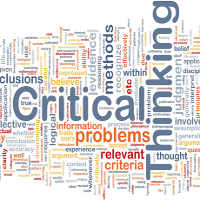
The difference between conceptual thinking and stereotypical thinking
Presented below is the concise depiction of what this subject concerns. We’ll be starting by explaining the most basic terms and introducing you to our perception of particular words used in conceptual and stereotypical thinking.
We use the word “term” when it has a certain meaning, as well as precise, factual and methodological definition. Term’s function is therefore cognitive, not evaluative. That’s exactly the opposite of “stereotype”.
In “stereotype” the cognitive, methodological layer is minimal and the evaluating (positive or negative – positive stereotypes and negative stereotypes) is elaborate and decisive.
For example, the word “Jew” can be a term when it’s got a particular, precise meaning or is used in sociological, religious or academic context, but it can also make for a stereotype, when it’s used in an evaluative statement of someone with anti-Semitic beliefs: “Oh, it’s some kind of Scottish/Jew!”
Stereotypes are meant to affect certain groups of people, especially those who do not demand precise information and don’t check their credibility in trustworthy sources. In order to affect or manipulate those groups, you have to know which stereotypes are deemed positive and negative by them. The same word can be used as a different stereotype depending on the group.
For example, the word “liberal” may have both positive and negative meaning, as well as the word “cult”, which can be used as a stereotype (mostly negative) and a term. In this text, it is going to be used as a term.
Conceptual thinking is a way of thinking that relies on facts and aims for discovering the objective truth about a certain issue. A person who follows it doesn’t reject opinions that are contrary to theirs a priori, but rather tries to verify them and check them out. When they turn out to be in accordance with reality, this person is ready to change his beliefs and opinions about certain matter, to put facts and truth over their own views.
Stereotypical thinking, on the other hand, is dominated by ideologies, preconceptions, stereotypes (hence the name), and habit, etc. When a person who follows this type of thinking meets with views and information destroying his or her preconceived beliefs, he or she is ready to reject this information without verification, as well as reduce or avoid contacts with people who proclaim them.
“…By analyzing inside relations among many religious groups, you can come to the conclusion that they’re dominated by an absolute, indiscriminate obedience to some guru, leader or administrator, which is beyond dispute. Any form of questions, discussions, doubts or attempts to attain the truth is deprecated.
If I’m a teacher, lecturer or scientist, it’s important to pay attention to what kind of model of teaching I incorporate into my classes. Do I encourage my students to think critically (though not mischievous spitting) – about the things they get from me too – to think on their own, to analyze, to look for information, to check facts in reliable sources, etc? Or do I prefer those who agree with me no matter what and never make any observation or points? It’s crucial to teach children to think on their own.”
Source: „Myślenie pojęciowe a myślenie stereotypowe”
Conceptual thinking and stereotypical thinking
A fragment from a book “Cybernatyka I charaker” by Marian Mazur:
Scientists are interested in reality as it is. Doctrinaires are interested in the reality as it should be.
Researchers want their views to match reality. Doctrinaires want reality to match their views.
Having found a disagreement between views and evidence, the scientist rejects views. Having found a disagreement between views and evidence, the doctrinaire rejects the evidence.
A scientist considers science to be a profession to which he feels passion. A doctrinaire considers the doctrine a mission to which he feels the vocation.
The scientist looks for „truth” and is concerned about the difficulties in finding it. The doctrinaire knows the „truth” and enjoys its completeness.
The scientist has a lot of doubts whether it is „true” what science says. The doctrinaire has no doubt that it is „true” what the doctrine says.
The scientist thinks what science says is very impermanent. The doctrinaire considers what the doctrine says as eternal.
The scientists strive to highlight the differences between science and doctrine. The doctrinaire aim to blur the differences between science and doctrine.
The scientist does not want to be attributed to doctrine. The doctrinaire wants science to be attributed to him.
The scientist avoids even the appearance of doctrine. The doctrinaire strives even for the appearance of science.
The scientist tries to refute the views existing in science. The doctrinaire tries to counter the refutation of views existing in the doctrine.
The scientist considers the creator of new ideas as an innovator. The doctrinaire considers the creator of different ideas to be an enemy.
The scientist considers progress when someone gets away from the current views of science. The doctrinaire considers it a traitor when somebody breaks away from the doctrine’s views.
The scientist believes that if something is not new, it is not valuable for science, and therefore does not deserve interest. The doctrinaire believes that if something is new, it is harmful to the doctrine, and therefore deserves to be condemned.
The scientists are proud that so much has changed in science in such a short time. The doctrinaires are proud of the fact that nothing has changed in doctrine over such a long time.”

[…] Look also: What is Marxism by Krzysztof Karoń The difference between conceptual and stereotypical thinking by Andrzej Wronka […]